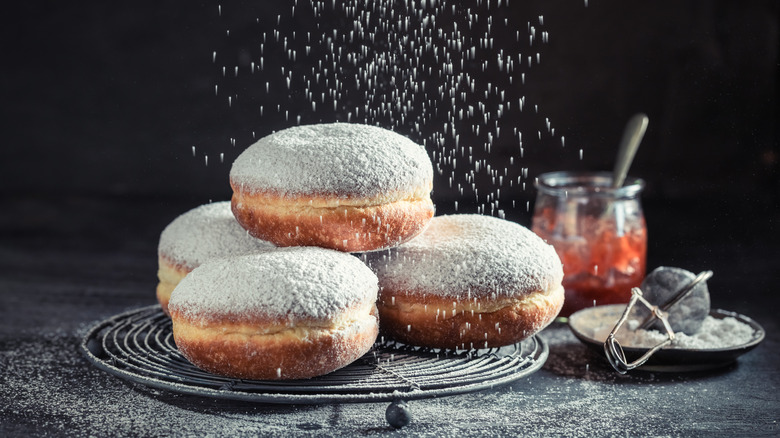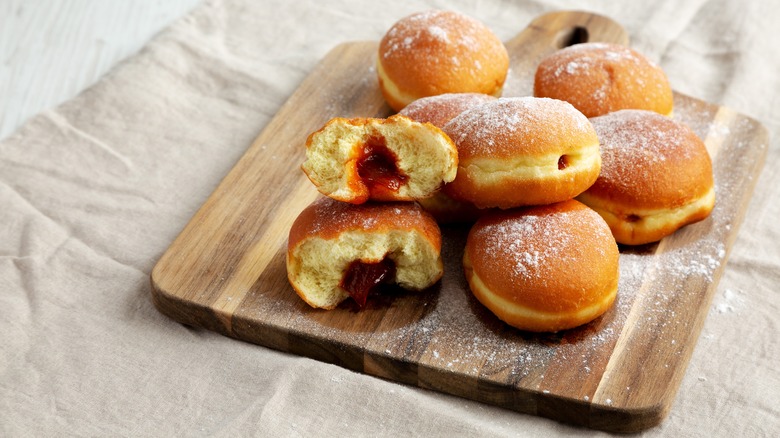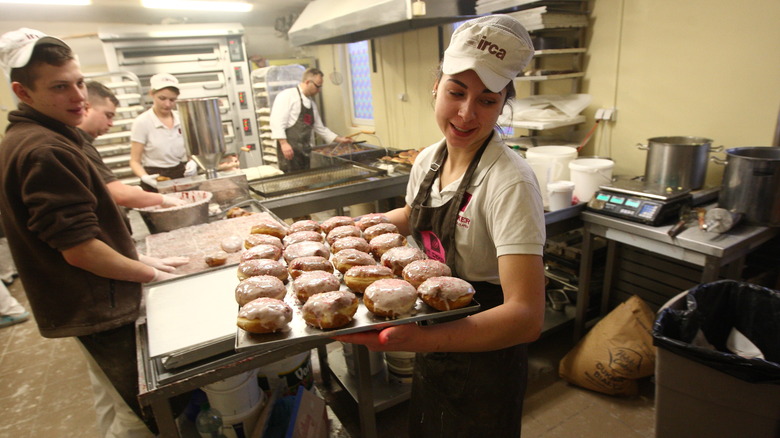Paczki Donuts Are Like If Krispy Kreme Used Vodka
Donuts are a classic example of doppelgänger foods, that is, foods found in multiple cultures in multiple parts of the world that all share the same basic concept. It seems that nearly every country on Earth enjoys some form of fried dough treat, from Spanish churros to Italian Zeppole. Then, you have paczki, Poland's contribution to the global donut scene. On the surface, they look a lot like the typical jelly donuts found throughout the United States—plump and round, with either icing or a dusting of powdered sugar on top—but they are truly in a class of their own.
Paczki is actually the plural term for these donuts. If, for some inexplicable reason, you only wanted to order one, the proper, singular term to use would be paczek. They have a long history in Poland, dating back centuries, and are particularly associated with Fat Tuesday, known in Poland as Tłusty Czwartek. It's said that paczki were invented as a way to use up all of the indulgent ingredients that would be forbidden in the upcoming Lenten fast, including one particular addition that truly sets them apart: Polish vodka.
Why paczki are unlike any other donut
Vodka is the spirit of choice for most Poles, with Poland and Russia debating for centuries over which country really invented the drink. It's not too surprising then, that vodka is incorporated into paczki dough. But it's not just a point of national pride; the vodka serves a special purpose, preventing the paczki from absorbing as much of their frying oil as other types of donuts do. This makes the exterior much crispier than a typical American donut, although the interior is generally more dense, and the dough itself often incorporates butter for an extra layer of richness.
Paczki can be stuffed with a variety of fillings, typically some sort of jam or cream. The traditional fillings of choice in Poland are plum or rosehip jelly, but here in the United States, you'll find a lot of other variants.
Speaking of which, paczki are popular in America, but you'll only find them in regions with a substantial Polish-American population, most notably Midwestern states like Michigan, Illinois, and Wisconsin. You can also find them in parts of New York and New Jersey, particularly the historic Polish-American neighborhood of Greenpoint, Brooklyn. Even in these regions, though, you won't find paczki all year round. They're a special treat reserved for Fat Tuesday, so central to the culture that some even call it Paczki Day.
Patczki are a central part of Poland's Fat Tuesday tradition
Most Americans probably associate Fat Tuesday with New Orleanian foods like Mardi Gras King Cake, but in Polish-American communities, it's all about the paczki. With roots in an overwhelmingly Catholic country, it's no surprise that most Polish Americans celebrate Lent, and as previously mentioned, the desire for one final day of indulgence before the 40-day fasting period is what originally inspired these donuts. Paczki are so integral to the occasion that they've even given their name to the holiday.
A large influx of Polish immigrants to the United States in the early 1900s marked the origin of Paczki Day in America, and it has only expanded since then. In the runup to Paczki Day, Polish bakeries in cities like Chicago and Detroit prepare tens of thousands of paczki to satisfy the crowds of customers that will line up outside on that special Tuesday morning. Some cities even host paczki eating competitions.
These days, there is even a special Paczki Day vodka, made by Detroit City Distillery to honor the spirit's role in distinguishing paczki from their donut cousins around the world. Incredibly, it is made by distilling actual raspberry-filled paczki in 100% vodka, and its limited holiday run typically sees the supply sell out in a day or two.


